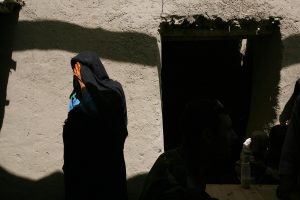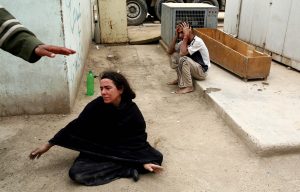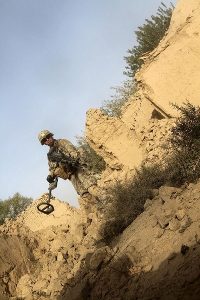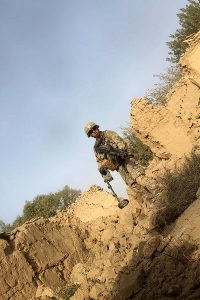
July 23, 2007: NATO British soldier with the Royal Anglians B Company calls for water to cool down his weapon during a firefight against Taliban insurgents after elements of B Company came under fire during a regular patrol on the outskirts of Kajaki in Afghanistan. Photo: Joao Silva
In the late 1990s, a patient was referred to my Neuropsychiatry clinic. She was a middle-aged woman who had been brought to the Emergency Room by ambulance with signs and symptoms initially suggestive of a stroke. However, brain imaging was normal and neurological examination revealed certain, atypical signs that suggested a primary psychiatric disturbance (sensory changes that did not fit a dermatomal distribution, a level of consciousness that waxed and waned). The diagnosis of conversion disorder was made, correctly, as subsequent events revealed.
By the time she arrived to see me, the quasi-neurological difficulties were resolving. She was now able to give a full and eloquent history. I learnt that she was a front-line journalist who had recently returned from covering a famine in East Africa. This was not her first exposure to frontline journalism–her career stretched back over a decade – but it was amongst her most traumatic assignments for she had witnessed mass starvation and death on an enormous scale. Distressed by what she was witnessing, she had resorted to alcohol as a way of damping her anxiety and helping her fall asleep. She managed to limp through her period in the field, keeping her emotions under control. On returning to Toronto, she thought she had put the worst behind her. It was while sitting in a restaurant with her husband that she suddenly found it difficult to speak and stay awake. Her husband, understandably alarmed, had called the ambulance.

October 31, 2006: Sgt Jesse E. Leach drags Lance CPL Juan Valdez of the for 4th mobile assault platoon Weapons company 2nd battalion 8th Marines to safety moments after he was shot by a sniper during a joined patrol with the Iraqi Army in Karmah, Anbar Province, Iraq. Valdez was shot through the arm and the right side but survived. Photo: Joao Silva
One of the aspects of her history that intrigued me was her initial reluctance to acknowledge her emotional distress and reach out for help. She was aware, while out in the field, that her moods were awry and that she was becoming increasingly anxious. And yet she had done nothing about this, other than resort to alcohol to self-medicate her distress. She worked for a large, well-resourced news organization–why had she not contacted someone for help? Her answer gave me an immediate insight into the world of the foreign correspondent, cutting through my naiveté and revealing one of the hidden challenges faced by these most public of journalists. “You don’t understand my profession,” she told me. “If you let on that you are emotionally unwell, you will never again be sent on these types of assignments. It means the end of your career. You muddle through, but you never let on how you are feeling. We all know this.”

July 16, 2007: An Afghan woman waits for her prescription after seeing an Afghan National Army doctor at a temporary medical clinic set up by the Afghan National Army, backed by US logistics support team and British forces in Sangin, Helmand Province, Afghanistan. Civilians started returning to Sangin after recent military operations by the British NATO forces pushed the Taliban out of the region. Photo: Joao Silva
Taken aback by this revelation, and frankly skeptical of her assertions, I asked my research team to take a few hours off from their brain imaging work which focused on depression in people with multiple sclerosis, and to search the literature to see what had been written on the subject of war, conflict, and the psychological wellbeing of journalists. A second surprise was in store for me. Not a single article appeared in the Medline and PsycINFO databases. Behavioral researchers had passed it by. Notwithstanding a formidable amount of research devoted to psychological trauma in veterans, fire-fighters, police officers, and victims of assault and rape, amongst others, no research had been devoted to journalists who covered war and disasters. There would be no insights forthcoming from the medical and psychological literature.
I was intrigued as much by the absence of any research on the subject as by my patient’s presentation. She was a fascinating person to treat for she had traveled the world for a decade, bringing back news of far-flung conflicts for a Canadian public keen to be kept informed. Unbeknownst to her readers, and until recently her psychiatrist, was the emotional toll this work had taken on her.

August 22, 2004: A militiaman loyal to Shiite cleric Muqtada al-Sadr aims towards U.S. positions in a cemetery in Najaf, Iraq. As negotiations between Sadr and the interim Iraqi government stalled on Sunday, American forces intensified pressure on rebels loyal to the cleric, briefly pushing within 400 yards of his base at the shrine of Imam Ali. Photo: Joao Silva/The New York Times
“Chance favours the prepared mind,” observed Louis Pasteur. My long-standing interest in psychological trauma left me curious to know more about the psychological wellbeing of war and conflict journalists. My patient’s interesting career, which had afforded her a ringside seat as history unfolded, spurred me to write a grant application and submit it to the Freedom Forum in Washington, D.C. I proposed a detailed study, looking at rates of psychopathology in war journalists. The grant was funded, a collaboration was forged with John Owen, Director of the Freedom Forum’s office in London, and the results of the 18-month study were published in the American Journal of Psychiatry on the one year anniversary of the attacks of September 11.1 Major news organizations (CNN, BBC, Reuters, the Associated Press) had been keen to take part and had opened their roster of correspondents to me. The 140 journalists who took part were no less eager to tell me how they were feeling. The data revealed a high lifetime prevalence of posttraumatic stress disorder (PTSD) and major depression, with rates of the former approaching that seen in combat veterans. Here the emphasis on lifetime is important because my research underscored both the cumulative nature of the risks confronted and, by extension, the accumulating burden of psychiatric illness. For one of the most remarkable statistics to emerge from this study was the longevity of exposure to grave danger that is integral to war reporting. On average, the journalists had spent 15 years working in war zones; a remarkable statistic, and a duration of exposure to potentially life-threatening events that is surely unrivalled by any other profession, the military included. And this for a profession not schooled in violence.

April 19, 2008: A resident of Ramaphosa Squatter settlement on the outskirts of Johannesburg uses a golf club to demolishes a shack to stop the fire from spreading after several shacks were set alight. Xenophobic violence has claimed the lives of at least 20 people over the past week in an around Johannesburg. Photo: Joao Silva
To the credit of the news organizations taking part in the study, the one statistic that they found of even greater interest and importance was the one that showed very clearly that journalists with PTSD and depression were no more likely to be receiving psychiatric treatment than their colleagues who did not have these disorders. This finding has led to a sea change in attitudes amongst many of the media organizations in North American and Europe that send journalists into harm’s way. They now recognize that it is insufficient to focus on physical safety alone. War, disaster, and conflict may leave a journalist physically unscathed, but psychologically scarred. Here were data attesting to this and moreover, these data carried implications that extended beyond the immediate health of the journalists. PTSD and depression can affect the wellbeing of family, friends, and colleagues as well. To news organizations maintaining bureaus in countries that had become war zones, like Iraq and Afghanistan, having a journalist with PTSD on site could compromise the safety of colleagues. A traumatized journalist can behave erratically, display impaired judgment, show increased irritability and, in general, undermine the safety and cohesiveness of a bureau already under siege in a hostile locale. Therefore, it is imperative for those in need to receive the requisite therapy. Effective treatments, be it cognitive-behavior therapy, prolonged exposure therapy, or Eye Movement Desensitization and Reprocessing, are all available within a Western health care system.

March 27, 2008: The mother and father of a three year old boy, who was shot and killed while playing near his home, weeps outside the morgue of a hospital in Sadr city. Fighting continued for a third day between Sadr militias in Sadr city and Basra. Photo: Joao Silva
This initial study raised more questions than answers. Subsequent studies each addressed a different question: how were domestic journalists in New York City faring psychologically after 9/11?2 Was it psychologically helpful or harmful for journalists to be embedded with the military during the Iraq War?3 Could one predict, based on cognitive constructs, which journalism students would chose the foreign correspondent career track?4
Another avenue of research pursued was to investigate the emotional health of local journalists working in dangerous places. UNESCO commissioned a study of Mexican journalists.5 Studies of Kenyan6 and Iranian7 journalists were also subsequently completed. Notwithstanding the disparate cultural backgrounds of these journalists, a consistent finding emerged. PTSD, depression, and substance abuse were significantly more likely to occur in journalists who had been traumatized. However, unlike in my earlier study which prompted Western news organizations to become more responsive to the emotional health of their journalists and make therapy available to them, no such change occurred outside Canada, the USA, and Europe. Non-western journalists covering news of war, revolution, and corruption are threatened, assaulted, kidnapped, tortured and killed and little or no help is offered to those who survive. For some, the psychological consequences of these stressors are profoundly disabling.
All war journalists are exposed to grave danger, but the degree of exposure is highest amongst the photojournalists. This is inevitable given the nature of their work. You cannot hang back from the fray and get a good photograph. The risks, high to begin with, increase with close proximity to the event. This observation led me to explore, in greater depth, the lives and careers of 12 extraordinary war conflict photographers. The project was supported by the Globe and Mail, Canada’s national newspaper and the series may be found at http://tgam.ca/ShootingWar.

May 23, 2009: An US EOD – Explosive Ordinance Disposal Technician destroyed an IED (improvised explosive devise) on a hilltop on the outskirts of Qalat, Zabul province, Afghanistan. Photo: Joao Silva
I chose photojournalists based on my familiarity with their work. My idea was to select one photograph from the portfolio of each photographer. Each photograph, for a variety of reasons, told a powerful story. The series reveals not only the extraordinary creativity of the photographers and the dangers that they confront in pursuing their work, but also the costs paid in doing so. When you go behind the lens and explore the lives of these contemporary visual historians, it becomes readily apparent that bravery and creativity, while necessary prerequisites for this kind of work, are no antidote to physical, emotional and moral injury. Although I am concentrating on Joao Silva’s image and story for this article, I offer the briefest of summaries of the costs paid by the other eleven photojournalists: Ron Haviv marked for assassination by a rogue warlord, David (Chim) Seymour killed at Suez, Corinne Dufka blown up in her armoured vehicle and wounded, Santiago Lyon wounded, Don McCullin wounded multiple times, Tim Page wounded five times in Vietnam (including a penetrating traumatic brain injury), Sebastiao Salgado incapacitated by physical and emotional exhaustion, Ashley Gilbertson brought down by guilt, Alexandra Boulat deceased at 45 years of age (albeit not combat-related), and Robin Hammond incarcerated and intimidated by Robert Mugabe’s goons. Faced with this array of life-threatening stressors, it should not come as a surprise that, for some of these photojournalists, post-traumatic stress disorder has added considerably to the challenges faced. The only photographer untouched by a malevolent hand was the amateur amongst them, banker Charles Porter, a man who never visited war zones, but who happened to have his camera with him in his Oklahoma City office on April 19, 1995, the day Timothy McVeigh blew up the Alfred P. Murrah Federal Building. Porter, who subsequently left his banking job and became a physical therapist, is the only one amongst this pantheon of photojournalist greats to win a Pulitzer for his work, lending credence to Susan Sontag’s opinion that:
Photography is the only major art in which professional training and years of experience do not confer an insuperable advantage over the untrained and inexperienced – this for many reasons, among them the large role that chance (or luck) plays in the taking of pictures, and the bias towards the spontaneous, the rough, the imperfect. (There is no comparable level playing field in literature . . .or in the performing arts . . . or in film-making. . .) 8
By design, I began my series with Joao Silva. On October 23, 2010, while on patrol with American marines in Afghanistan as an embedded photographer for the New York Times, he stepped on a landmine. Fifty six years earlier, the legendary photojournalist Robert Capa had done the same thing in Vietnam. Capa died, Silva did not, his survival due to the extraordinary progress made by military medicine in the intervening years. Silva’s injuries were grievous. His legs were shredded and he had extensive abdominal trauma. Thrown to the ground by the force of the blast, lying in the dust of Afghanistan, conscious and cognizant of his life threatening injuries, Silva’s first impulse was to continue taking photographs. He gets off three frames before the medics take his camera away from him and begin saving his life.
 The first of three frames shot by photojournalist Joao Silva after stepping on a landmine in Afghanistan. |
 The 2nd of three frames shot by photojournalist Joao Silva after stepping on a landmine in Afghanistan. |
 The third of three frames shot by photojournalist Joao Silva after stepping on a landline in Afghanistan. |
His insouciance in the face of death, his composure in reaching for his camera to take photographs, his relentless drive to keep working in the face of his own potentially imminent death – these were some of the factors that made me want to begin my series with Joao’s remarkable photographs. Silva was no neophyte when he stepped on that landmine. His pedigree as a conflict photographer went back to 1994, when he covered the run-up to the first multiracial democratic election in South Africa, a particularly violent time in which he witnessed and photographed the death of his close friend and fellow-photojournalist, Ken Oosterbrook.

December 12, 2001: An American B-52 bomber circles the sky above the Tora Bora mountains in eastern Afghanistan as an eastern alliance Mujahedin warrior looks on. American bombers continued to bomb Al Qaeda positions today in the Tora Bora mountains despite surrender negociations being underway between Al Qaeda and the eastern alliance. An undisclosed number of Al Qaeda fighters continue entrenched in bunkers in the Tora Bora mountains. Photo: Joao Silva
I had interviewed Silva twice before he was injured in Afghanistan, both times in his home city of Johannesburg, South Africa and with the photographer in robust health. When we met again, post-Afghanistan, the circumstances were very different. He was living alone in an apartment in Bethesda, provided for him by the New York Times so that he could be close to his medical team at the Walter Reed National Military Medical Centre. His in-patient care was over, but extensive rehabilitation was still needed. Not only had Silva undergone a bilateral leg amputation, he had been left with a persistence abdominal wall infection that required weekly surgical interventions under general anesthetic. His life, far from his wife and young children, had been given over to a succession of medical appointments and interventions. He was in constant pain. His diet was severely curtailed. Ambulation on his prostheses was challenging. It remained unclear whether he would be able to work as a photojournalist again. A mountain of obstacles lay ahead, but his spirit had not been broken. The fortitude he had brought to his work as a war photographer, the courage that he had shown in photographing the burning township in South Africa and the Mahdi’s army during the war in Iraq, was now self-directed and being applied to his own rehabilitation.
This is not to say Silva’s mood was upbeat. As he described it to me, he had been in a very dark place during his hospital stay and he was not out of the woods yet. But he coped by keeping his focus, harnessing an enormous willpower, taking one day at a time, staying in the here and now, keeping his attention and energies on the tasks that each hour brought, and refusing to allow his thoughts about an uncertain future to run away with him. His resilience was astounding. There were no signs of PTSD. The doctors at Bethesda were impressed by his fortitude. The psychiatrists went with their students to interview him, to learn from him and to try and understand what it was about this man that allowed him to marshal his coping resources so effectively.
I was no less intrigued. Listening to Joao speak about his recovery, from the earliest days in a military hospital in Germany to his stay in Bethesda, I became aware of what a long, hard, and lonely road he had traveled, in spite of the excellent care he received. His rehabilitation was as much about his own inner journey as it was about the surgeries undergone and the prostheses fitted. It was clear to me that he had never once entertained the thought of failure. There was only one option open to him and that was recovery. In those wee small hours of the morning, where there is no place to hide from one’s fears, when the thought of defeat, of not being able to surmount a myriad of medical problems, was most likely to surface, he fought his demons and beat them. I can only imagine how hard this must have been for him, and imagination surely falls short in circumstances like these. With each setback, and there were many, he would pick himself up and start all over again, his steely resolve fixed on being able to walk unassisted, his body free of infection. No one taught him this. From the moment he fell, reaching for his camera to record the moment, to those long days and even longer nights in a lonely Bethesda bedroom community, an innate resilience was evident. I have no doubt that this behavioral trait was integral to his ultimately successful rehabilitation. When we met again, a year later in Johannesburg, Joao was on assignment once more for the New York Times. His war days may have been over, but a subsequent email sent from Paris made me smile – he was back on the road, en route to Togo.
The drive and determination that Joao Silva displayed as a war journalist, the very traits that allowed him to gain access to the world’s most dangerous places, stood him in good stead during his rehabilitation. None of the other 11 journalists I interviewed for my “Shooting War” series, apart from Tim Page, suffered physically to the same degree. But all had voluntarily journeyed into the vortex of conflict to do their work, each drawing on a deep well of courage and fierce desire to record history with a camera. These attributes of temperament not only allow them to fulfill an important civic function, namely keeping societies informed of world events that in an age of globalization affect us all, but also to overcome the fall-out that comes from working in zones of conflict. Here no distinction is made between the physical and emotional, for as Joao Silva’s history so clearly reveals, both are tightly intertwined. The fact that health care specialists who work in rehabilitation have long known this does not diminish the lessons to be learned from the careers and tribulations of the great war photographers. Affirmation too can prove inspiring. Overcoming the odds, at times insuperable, is a theme that readily resonates within the rehabilitation community, for patients and therapists alike. It is no stranger to the war photographers too.














 Member since 2019 | JM14274
Member since 2019 | JM14274


NO COMMENT